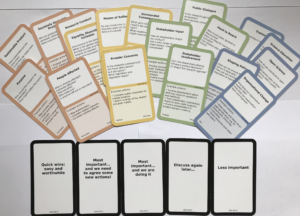Written by Chris Greenhalgh, Professor of Computer Science, University of Nottingham
“My approach to Responsible Innovation is guided by a sense of principled pragmatism. While I have collaborated extensively with social scientists over the years it is not my native territory; by inclination I am a builder, albeit of software-based systems. As a member and co-founder of the Mixed Reality Lab, which is essentially a multi-disciplinary Human-Computer Interaction research group, human-centred methods are a big part of what I do. Many of the pieces of software that I have developed or led, are intended to be used with and by non-programmers, in support of, for example, creating rich interactive experiences (EQUIP, Musicodes, Losing Her Voice), collaborating in virtual worlds (MASSIVE) or supporting activities using cards (Cardographer).”
“I can agree with the principle articulated in Stilgoe et al’s 1 definition: “Responsible innovation means taking care of the future through collective stewardship of science and innovation in the present”. However it is not immediately clear (to me, at least) what such stewardship practically entails. At the same time, I am co-leading responsible innovation projects as part of Horizon and the TAS (Trustworthy Autonomous Systems) Hub; part of the remit of these projects is to support and encourage responsible innovation in those research programmes. My working conclusion is that the essence of responsible innovation, at least as applied to diligent researchers, is a form of boundary critique: it challenges researchers not to fixate on a narrow understanding of their work and responsibilities. For example, in the University of Nottingham there are clear institutional policies and incentives for researchers to spend time on, for example, research ethics (in relation to participants and personal data), “doing” the work, publishing it (including open access) and applying for further funding. However, for many researchers there are no penalties for ignoring sustainability and few or no direct incentives to invest time in it.”
“In the Horizon RRI project, we have developed a first public version of a set of RRI “Prompts and Practice” cards (physical and digital). We have drawn on the AREA-PLUS framework for RRI3, which structures the space of responsible innovation in Information and Communication Technologies along two axes, of activity (Anticipation, Reflection, Engagement and Action) and focus (Purpose, Product, Process and People), to provide a grid of 16 cells as an organising principle for the set of cards. Starting from these axes and the questions posed by the AREA-PLUS framework, we have sought to link each cell to a particular area of possible concern (such as sustainability). We have also incorporated possible actions into each card, signposting practical steps that a researcher could take. In this way, we aim to highlight a broad range of issues and concerns that might otherwise be overlooked or ignored, in a concise and accessible way. “

“The RRI Prompts and Practice cards have generally been very well received in the various training and facilitation events where we have used them. One of the biggest virtues – but also the greatest challenges – of this set of cards is that there are only 18 cards (in this version two of the grid cells have two cards). This makes it feasible to engage with the whole deck in a relatively short activity (e.g. half an hour or so), and provide some immediate positive feedback. We are now developing a second public iteration of the cards, incorporating the feedback received to date and plan to publish the new deck in a couple of months or so. We are also continuing to develop the Cardographer software platform which has been used to create the cards, and which also supports (especially online) card sessions and analyses of card use. Hopefully in this way we can continue to hold together both the principles and the pragmatics of responsible innovation.”
